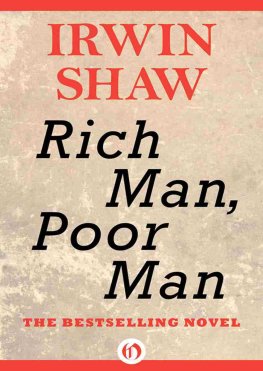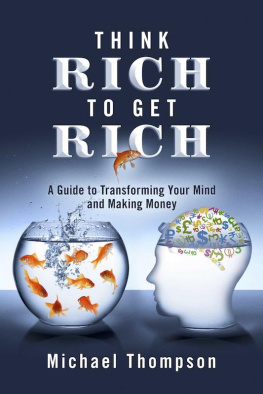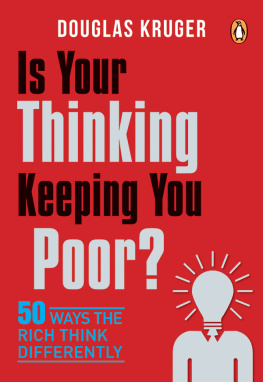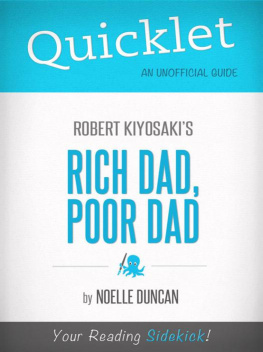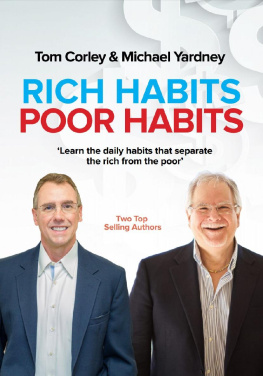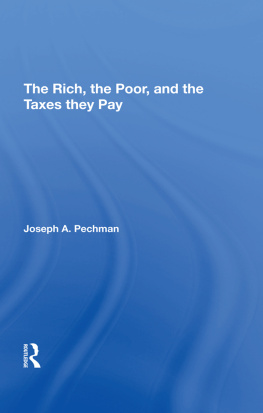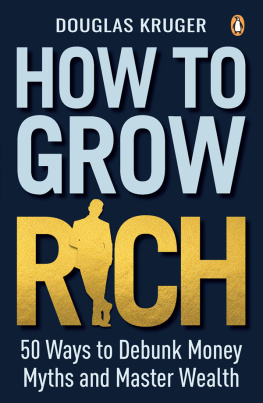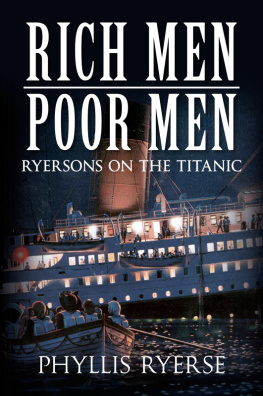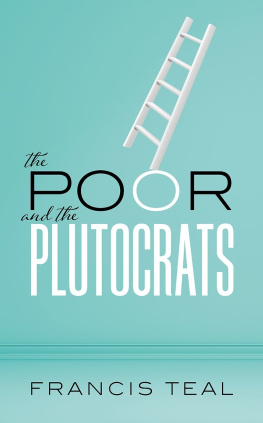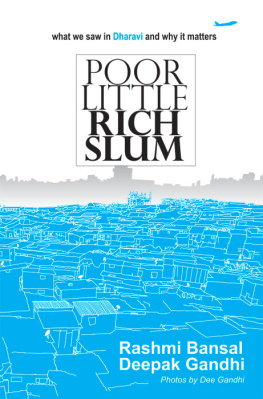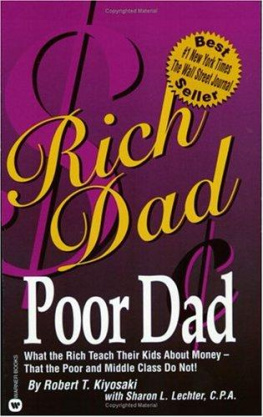Douglas McCallister - Rich man, poor man
Here you can read online Douglas McCallister - Rich man, poor man full text of the book (entire story) in english for free. Download pdf and epub, get meaning, cover and reviews about this ebook. genre: Romance novel. Description of the work, (preface) as well as reviews are available. Best literature library LitArk.com created for fans of good reading and offers a wide selection of genres:
Romance novel
Science fiction
Adventure
Detective
Science
History
Home and family
Prose
Art
Politics
Computer
Non-fiction
Religion
Business
Children
Humor
Choose a favorite category and find really read worthwhile books. Enjoy immersion in the world of imagination, feel the emotions of the characters or learn something new for yourself, make an fascinating discovery.

- Book:Rich man, poor man
- Author:
- Genre:
- Rating:3 / 5
- Favourites:Add to favourites
- Your mark:
- 60
- 1
- 2
- 3
- 4
- 5
Rich man, poor man: summary, description and annotation
We offer to read an annotation, description, summary or preface (depends on what the author of the book "Rich man, poor man" wrote himself). If you haven't found the necessary information about the book — write in the comments, we will try to find it.
Rich man, poor man — read online for free the complete book (whole text) full work
Below is the text of the book, divided by pages. System saving the place of the last page read, allows you to conveniently read the book "Rich man, poor man" online for free, without having to search again every time where you left off. Put a bookmark, and you can go to the page where you finished reading at any time.
Font size:
Interval:
Bookmark:

Douglas McCallister
Rich man, poor man
CHAPTER ONE
"Well, my lovely wife, here we are in one of the finest French restaurants in the city," John Whitmore commented to his lovely wife. "Do you know what you'd like yet?"
Penny's pert face peered out from behind the huge menu. "I dunno," she said.
"Well, can I suggest something?"
"What?"
"Perhaps some pate de foie gras to begin with"
Penny shook her lovely head and her glistening red lips formed themselves into a grimace of displeasure. "Oh, not liver," she protested. "I just can't stand liver, it makes me want to throw up."
John shuddered. Jesus Christ, did she have to express it in just that way? He knew how she felt about liver, lots of people did, but they were more polite about their feelings at least! But John said nothing to his wife. They had gone through too many unpleasant scenes after he had made some attempt to smooth her rough edges. It never did any good, the edges remained as ragged as before, and only lead to more of the mutual dissatisfaction they felt towards one another. He thought for a moment of suggesting caviar, but remembered only too well her reaction to that. "Fish eggs, yuk!" Which was true in a sense, although he considered them one of the great delicacies of the world.
John had to say something to his wife, that was obvious. They couldn't just sit there across the table, staring at one another in silence. He called the waiter and ordered onion soup, then handed him back the menu. With a false bright smile, he took a sip of the fine red wine and asked: "Well, my dear, did you like the play tonight?"
Penny let forth a raucous laugh that grated on John's nerves and made others near them in the restaurant turn and stare. "Trash," she said. "That's what it was."
John stared at her in silence. How on earth could she have said such a thing? Didn't she understand the significance of the play? The subtle beauties of it, the profound depths of feeling, the startling ideas? Apparently not. But he knew he could never explain them to her and so he merely said at last, "Why do you say that, Penny?"
"Because there were those garbage cans on stage," she answered emphatically. "That's why."
This time John felt obliged to protest. "But garbage cans on stage don't make the whole play 'trash' as you so elegantly express it." There was just a hint of irony in his voice.
"It does to me," Penny said, shrugging her lovely shoulders and turning to stare around the room. "Oh, look," she said suddenly, pointing to a couple who had just come in and were now being seated against the other wall. Once again John blanched. Why did she have to point at people? He saw that others, attracted by her strident voice, were in turn staring at his wife.
"Yes, Penny," he said quietly. "Look at what?"
"That woman over there. Did you ever see such an awful dress in
your life?"
John closed his eyes, wishing that he could disappear. Why, why did Penny always have to make such a spectacle of herself? He answered the question himself. Because that was the way she was; there was no other explanation. And there was no way to change her, either. He knew that from long experience. And then the other question, the basic question that nagged at him came to his mind. Why had he married her? The answer to that, he supposed, was that he just didn't know any better.
She had been the most beautiful woman he had ever seen, that night when he had first set eyes on her at the old Dewitt Theater. She was in the chorus, third from the end, as he still remembered, and he had sucked in his breath in awe at her loveliness when she first danced onto the stage. And he had to admit that he hadn't taken his eyes off her all evening!
Penny didn't really dance well, he thought now, although she certainly moved with an exquisite grace. But to John Whitmore, still in college, she represented a whole new world of excitement and intrigue. She was alive, vibrant, her world, the real one, he had thought. The university, where he was a senior, with its shaded walks, its discreet and even modest red brick buildings, its musty books arranged on the shelves of the huge library was remote, unreal, dead compared to her.
That first night he had seen Penny, John had had a date with a wealthy debutante who was studying art, and he'd not had the courage to ditch her in order to go backstage and meet the lovely brunette chorus girl. But he'd bought a single ticket for the next night's performance and had hurried around to the stage door immediately after, only to find that someone else had got there first.
But, John had gone back a third time, and his persistence was rewarded. He not only met this gorgeous creature but took her out to a late dinner after the play. He was dazzled by her beauty. Her skin was like alabaster, white and smooth as marble. Her features were finely chiseled, her big blue eyes set wide apart in her lovely face. Her nose was, perfect, that was all and her lovely lips parted to show a row of equally perfect teeth. And her figure was absolutely breathtaking!
She had firm high breasts that her chorus girl costume, and later the low-cut dress she wore showed off to the fullest advantage. Her waist was tiny and flared into firmly rounded hips and thighs. And her legs, even now John caught his breath at the thought of them, her legs were superb, the best he had ever seen; long and slim and tapering into curves that were simply indescribable!
So John had been dazzled. He had sat and stared at the raven-haired beauty, ignoring both what she said and how she expressed it. She was perfection, at least in appearance, and that was enough for him. He pursued her ardently, and in spite of the objections of his aristocratic family, he offered her marriage.
When Penny accepted, the two hurried off to a Justice of the Peace; when they emerged from his dingy office, she was Mrs. John Stewart-Linden Whitmore IV. After a brief honeymoon and an even briefer visit to John's parents, who were not in the least impressed by their new daughter, Penny went back to the chorus line, and John went back to school.
Somehow he managed to get through the rest of the year, seeing Penny as often as possible, and he even managed to pass his exams and graduate with the rest of his class. He refused to go into his father's firm, though, and found a job on his own, while Penny quit hers. They took a small apartment and lived happily, blissfully, ideally, not ever after but for a few months, anyway. And then, in spite of all of Penny's considerable charms, John began to get bored very bored.
Oh, God! She was still great in bed and just thinking of Penny even at work was enough to send shivers up and down his spine, make his young cock lurch with passion and swell beneath the tight cloth of his trousers until he was embarrassed to stand up to greet a client. He would hurry home after work to find her waiting, dinner on the table. They let it grow cold, never noticing, while they headed for the bedroom, John stripping off his own clothes while they went, pulling off Penny's once they were inside it.
She helped, wriggling out of her short, skintight dress that had already revealed her ripe young breasts, the sensuous curves of her undulating buttocks. And then he would slip his hand beneath the soft nylon mesh of her brassiere, fumbling clumsily with the fastening at the back of it with his other hand, until at last he pulled the two ends free and the quivering mounds of her milk-white breasts sprang forth.
He would run his hands down her soft warm flesh then, down to the waistband of her little panties, hook them beneath it and ease them down over her throbbing hips and thighs. And then she would stand before him, naked and lovely, sending shock waves of passion to rock his body after he had pushed her down on the bed, he would hover over her, his
Next pageFont size:
Interval:
Bookmark:
Similar books «Rich man, poor man»
Look at similar books to Rich man, poor man. We have selected literature similar in name and meaning in the hope of providing readers with more options to find new, interesting, not yet read works.
Discussion, reviews of the book Rich man, poor man and just readers' own opinions. Leave your comments, write what you think about the work, its meaning or the main characters. Specify what exactly you liked and what you didn't like, and why you think so.

